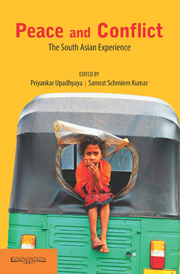Book contents
- Frontmatter
- Contents
- Foreword
- Preface
- Introduction
- 1 Conflict Resolution and Peacebuilding: Ideas, Approaches and Debates
- 2 Changing Perspectives on Peace Studies in South Asia
- 3 Peace Pedagogies in South Asia: Interreligious Understanding
- 4 Responses of Communities to Social Tension
- 5 Plurality of Peace, Non-violence and Peace Works in India
- 6 Education and Culture of Peace: Engaging with Gandhi
- 7 Structural Violence and Human Security: Gandhi's Visions
- 8 Women and the Peace Process in Nepal
- 9 Quest for Peace and Justice in Pakistan: Lawyers' Non-violent Resistance
- 10 Antinomies of Democracy and Peace in Nepal
- 11 Post-armed Conflict Trajectories in Sri Lanka
- 12 Environmental Security and Conflict in Bangladesh: Nature, Complexities and Policies
- Contributors
- Bibliography
- Index
Preface
Published online by Cambridge University Press: 05 October 2014
- Frontmatter
- Contents
- Foreword
- Preface
- Introduction
- 1 Conflict Resolution and Peacebuilding: Ideas, Approaches and Debates
- 2 Changing Perspectives on Peace Studies in South Asia
- 3 Peace Pedagogies in South Asia: Interreligious Understanding
- 4 Responses of Communities to Social Tension
- 5 Plurality of Peace, Non-violence and Peace Works in India
- 6 Education and Culture of Peace: Engaging with Gandhi
- 7 Structural Violence and Human Security: Gandhi's Visions
- 8 Women and the Peace Process in Nepal
- 9 Quest for Peace and Justice in Pakistan: Lawyers' Non-violent Resistance
- 10 Antinomies of Democracy and Peace in Nepal
- 11 Post-armed Conflict Trajectories in Sri Lanka
- 12 Environmental Security and Conflict in Bangladesh: Nature, Complexities and Policies
- Contributors
- Bibliography
- Index
Summary
Peace and conflict studies are proliferating across disciplines in growing number of institutions and locations in South Asia, like elsewhere in the world. New interdisciplinary centres and departments have emerged which teach and research peace and conflict studies in its varied rubrics. This is in addition to the rising numbers of research institutes and think tanks dedicated to conflict analysis and peacebuilding. The subject matter of peace and conflict traditionally a preserve of international relations is drawing ever more on other disciplines like political science, sociology, psychology, anthropology, philosophy, religious and cultural studies and many others. Its scope is further widened by the inclusion of human security and non-traditional security concerns in the peacebuilding agenda. This is indeed a welcome development. The complex matrix of peace and conflict issues especially in South Asia certainly warrants deeper probe on a much wider template.
However, the budding field of peace and conflict resolution in South Asia is facing a crisis of relevance. Like in other areas of social sciences, it is caused by the unbridled sway of western pedagogies. With the exception of an uncritical delineation of Gandhian vision, there are not many indigenous approaches and critical insights, which inform the curriculum or methodology in this area. Notwithstanding a few counter currents posed by post-colonial and critical peace scholarship, the existing field of peace and conflict resolution is taught and disseminated in the region around western perspectives. This is not as much due to the paucity of knowledge and research on the subject, but more to the fact that the epistemological constitution of the disciplinary parameters that hardly allows voices from the marginalized southern hemisphere. The positivist and secular sway in the realm of conflict resolution, for instance, would not reckon with religion-based ideas and actors. The South Asian academic institutions too lag behind their northern counterparts in drawing indigenous pedagogies and analytical tools. All this has led to a significant epistemological and discursive deficit inpedagogies and research framework of peace and conflict in South Asia.
- Type
- Chapter
- Information
- Peace and ConflictThe South Asian Experience, pp. vii - xPublisher: Foundation BooksPrint publication year: 2014



